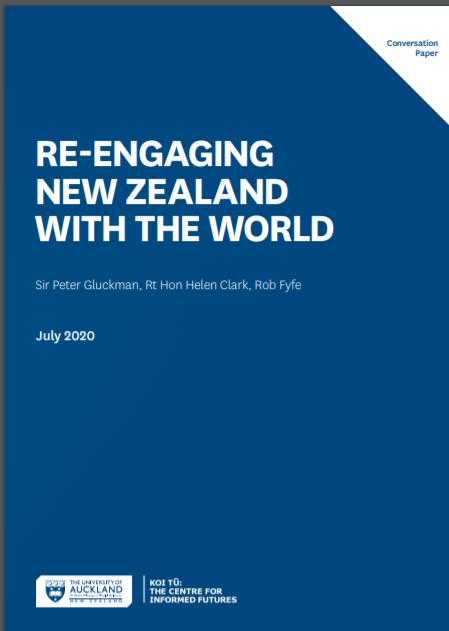From Koi Tū: The Centre for Informed Futures
July 2020
Authors: Sir Peter Gluckman, Rt Hon Helen Clark, Rob Fyfe with support from Sir David Skeggs and Dr. Andrew Chen
This conversation document is very timely. In the last few weeks, public narratives in social media, radio talkback and other mainstream media surrounding the lapse in border control measures need a circuit breaker. This document invites those who want to engage in a conversation to re-engage New Zealand with the world that is safe, sustainable, decent, fair, and as a responsible global citizen
There is much in this "conversation" document that I agree with. The significant issues are well presented and balanced. My contribution to this conversation is as follows:
- It is time to change the narrative from "elimination" to "proactive management." The nuance of “elimination” for those in the know is lost to the average person. Theirs is a more straightforward view – eliminate means completely remove. The world is still amid a surging pandemic. Some countries are managing this pandemic better than others. Reopening our borders even with countries we want to "burble with" or set up green lanes for travel makes sense. In so doing, detecting, and managing cases at our borders should not be a surprise and seen as a failure. Picking these cases up and managing them is “proactively managing” to keep New Zealand safe.
- Part of the proactive management will require those wanting to enter New Zealand as well as those in New Zealand to accept some new norms. The suggestion for example of a wearable device for contact tracing and reporting of symptoms like in Singapore is not rocket science. New Zealanders traveling to countries like Singapore, Hong Kong, or Taiwan will have to conform to such protocol. It is a condition of entry. The privacy and security of personal information can be technically overcome, but widespread adoption requires a mindset change for New Zealanders. Likewise, wearing a face mask is mandatory when in public in many of these countries, why is New Zealand still holding out.
- The hype of various unrealistic timeframe of when the first vaccine will be available is also well made. There is danger in seeing the arrival of a vaccine as the silver bullet. Even when a viable vaccine becomes available, the basics of social distancing, face mask, and personal hygiene are all here to stay. COVID 19 will not be the last of the great pandemic, so these "nonpharmaceutical interventions" are part of our new normal. It will also help significantly with the common cold and seasonal influenza.
- The point about COVID 19 being a complex challenge is important to note. It requires solutions that are novel and non-linear. That is why the narrative of "health first or economy first" is flawed. The reality is we need a go-forward response strategy that can do both. After all, the broader determinants of a society's wellbeing require both.
- Finally, all strategy requires rigorous delivery with attention to details, and with the ability to pivot and innovate. Empathy is compassion in action, so delivery needs to give substance to the message of "Be Kind."
The successful re-engaging of New Zealand requires the participation and trust of the 5 million living in New Zealand, New Zealanders abroad, the business community, health system professionals, and local and international partners. Therefore, going forward, New Zealand requires clarity in our re-engaging strategy. There also needs to be a communication approach that is clear and responsive to a broad audience in New Zealand and abroad. The world looks to New Zealand as one of the countries that could lead the way. Fulfilling this expectation requires our political leaders across the spectrum to lead by example collectively. Echoing President Obama, “when others go low, we go high.”
Chai Chuah
Former Director-General of Health, New Zealand.
3rd July 2020

